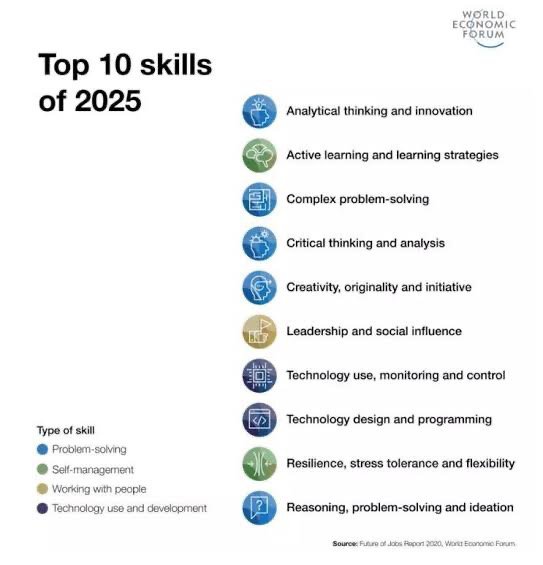Networking: The Ultimate Power Skill
I’m now in the part of my sabbatical where I’m exploring new work opportunities, and that has me thinking about the quality of my network as a gateway to finding an appropriate role. Networking tends to evoke mixed feelings depending on who you’re talking to. For some people, it calls to mind perceptions of elitism, privilege or exclusivity. For others, there are the practical frustrations of finding it a transactional, exhausting or inauthentic way of relating to other people. Personally, I'm quite positive about it - I enjoy networking and regard it as a core strength that I’ve been honing since my school days. Whatever misgivings we may have about networking, it has stood the test of time as the most effective way to work through people in order to identify and connect with opportunities.
Although concrete data is hard to find, this CNBC article written from an American perspective presents some interesting food for thought. The opinions shared feel intuitively applicable in a global context albeit to varying degrees, and perhaps with greater relevance to critical jobs as opposed to all jobs. These two data points jumped out at me:
“Research shows that 70% of all jobs are not published publicly on jobs sites and as much as 80% of jobs are filled through personal and professional connections.”
“According to LinkedIn’s own data, people who are referred for a job are a whopping nine times more likely to get it.”
This is in tune with multiple trends elsewhere such as the finance world where the majority of investment funding and deal-maker opportunities typically flow to individuals who belong to certain close-knit networks who vouch for one another.
It’s hard to argue against the notion of networking as being the ultimate power skill to master at any career stage and in any profession. That being said, I often wonder about what gets in our collective way of being effective at it and giving it the prioritisation it deserves. What follows next are a few observations about this issue.
Wrong framing
Given some of the negative perceptions attached to networking as mentioned earlier, perhaps a re-branding exercise could make it more appealing. The definition of networking that I like most is that it’s about connecting with people with the intention of helping one another achieve your respective goals. Alternatively, Carla Harris refers to it as “relationship currency” which neatly puts the emphasis back on the relational and mutually beneficial aspects tied to the concept. I like this too and often use the words interchangeably.
Lack of follow-through
It takes more than an initial meeting to consider someone a member of your network. If you aren’t following up with regular communication and helping each other then you’re probably acquainted but not connected. An urgent favour usually exposes the issue, and it can be awkward to expect a lot from a person in whom you’ve invested relatively little at the drop of a hat.
Limited scope
Only networking within a specific niche can appear harmless until the day you want to change jobs or your key sponsors can no longer support you for whatever reason. Looking beyond our comfort zone to create broad social and professional connections helps to keep agile, well-informed and encourages us to explore new spaces.
Taking access for granted
Oftentimes, we have access to a broad range of interesting people worthy of including in our networks but we procrastinate in developing a rapport with them. As people change jobs, relocate or retire, being slow to act complicates something that could have been easy. We miss out on the opportunity to easily meet and create depth over a long horizon.
Not broadening networks as circumstances change
Changing environments and roles warrant a broader range of people to support what’s currently on your plate. However, to really build a rich network, you’ll need to keep in touch with the people who helped get you to where you are as well.
I enjoy stacking relationship currency in social and professional circles, and admittedly still have a lot to learn and a long way to go. I’m happy to share my approach to making the process useful and fun.
My 5Ws for growing my network have been in steady rotation over the years, I like to keep it simple. By this I mean a regular consideration of Who I need to know, Why I need to know them, Where I will meet them, What I can offer / want to learn, and When I will meet them.
Building on that, career strategy coaching has helped generate ideas about different ways to engage with people in line with where they are in my networking universe. There are:
Champions with whom I have personal experience and regular contact, and will likely be my biggest supporters;
Influencers who are high profile people within my orbit and are aware of my activities from afar; and
Blue Sky people who are proverbially out of my league but who I want to pull into my network as an Influencer or Champion.
Having become more intentional with LinkedIn during recent months, I’ve realised how useful it can be to broaden my exposure to different people as a meeting point. Offline conversations will always be my preferred way to actually grow a relationship. That’s where new networking platforms that lead to meetings like Lunch Club offer a unique and complementary service to the LinkedIn experience. Practically speaking, I find it easier and more rewarding to focus on just 2-3 platforms with a fair degree of consistency and genuine engagement.
Exchanging value on matters big and small / social and professional is exactly what strengthens a network - the points of interaction grow organically when I put the focus on being helpful. It could be anything like arranging an event booking for a colleague, or brainstorming with a client who values my opinion.
I believe the main reasons why I find this relatively easy is because I try to be genuine, to do things in line with my personality type and I am good at evaluating where to invest my energy.
I start close to home and work my way up, meaning I’m equally keen to network with peers as well as with senior leaders. We’re all going in the same direction so it seems sensible to be on good terms with current and future decision-makers.
The pandemic has significantly flattened the networking playing field, although it’s still not quite level. With many plugged in virtually, free from the distraction of travel and exclusive events, I have found it easier to connect with some of the people on my Influencer and Blue Sky list. One year into this working from home / living at work arrangement, I do sense digital fatigue creeping in but engagement levels are still high and I’m shooting all my shots.
My preferred way to create value within my network is to introduce people to one another. It’s exciting to see the new ideas and unexpected positive outcomes that result from opening up the corridors of collaboration!
A final thought....
Zooming out again to look at what’s happening from a macro level, here’s a summary of the World Economic Forum’s assessment of the most desirable skills for future work.
Future of Jobs Report 2020, World Economic Forum
The survey implies a 2025 aspiration but this list already reflects market expectations in 2021. Robustly demonstrating these desired soft skills via the standard cover letter and CV approach - the basis on which most applicants are currently being declined - is pretty difficult. Recruitment processes that are no longer fit for purpose exacerbate the heavy reliance on networks to fill critical roles. This type of exclusion in the workplace - the ‘network gap’ as LinkedIn’s CEO Jeff Weiner puts it - can of course be reduced by re-designing recruitment but employers will move at different speeds on addressing this issue. Best to control what one can instead of waiting for sweeping systemic change!
This snapshot on the future of work hopefully prompts new thoughts on what each of us can and should do to stand out to our colleagues and networks to creatively demonstrate the qualitative competencies behind our achievements. With so much change happening all around us, it’s never been more important to be strategic, adaptive and intentional about networking.


